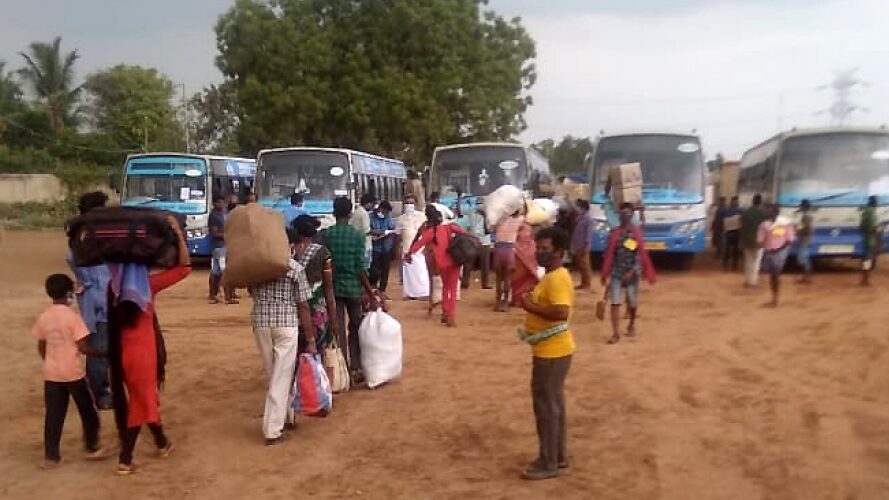Double Operation Frees 526 from Two Brick Kilns
Slavery
On Monday, IJM and our grassroots partners supported a critical rescue operation freeing 526 people who had been trapped at two abusive brick kilns during the COVID-19 pandemic.
This is the second-largest rescue operation IJM has ever supported.
The case began in mid-March, when IJM received information about 282 migrant laborers held in bonded labor at a kiln in Tiruvallur District. These families were from the state of Odisha, in northern India, and had traveled south to Tamil Nadu state under the promise of good jobs and fair wages. They were given advance payments of 20,000 to 30,000 rupees for their work ($265-400 USD), which then became escalating debts they would need to repay.
The reality was appallingly different: These laborers were forced to work for close to 13 hours a day without proper food or access to healthcare. Children were denied education, and those above the age of 10 were forced to work. Every day for the last six months, adults pounded clay and made bricks, while children dried them under the hot sun and arranged them in the kiln to be baked. Once fired, they removed the hot bricks and stacked them for sale.
At the onset of the COVID-19 pandemic, these laborers were anxious to get back home. But under the falsified debts of their advance payments, the owner refused to allow them to leave and also stopped giving them wages or food to sustain themselves. The families reached out to their relatives in Odisha, who in turn contacted IJM to begin working on the case. The laborers were able to get information out throughout the lockdown, narrating the harsh exploitation they were facing as they were forced to work in the kiln.
IJM passed intelligence on the case to our local partner Foundation for Sustainable Development (FSD). FSD helped contact high-level government officials—including the Chief Minister of Tamil Nadu, the Collector of Tiruvallur, and Odisha State-level leaders—to bring attention to the plight of these laborers trapped during the lockdown.
Dr. Krishnan, the founder of FSD, described, “The COVID-19 pandemic is being used by perpetrators to enforce the bonded labor system, and the disadvantaged population are vulnerable to this violence-based exploitation.”
On June 1, the District Administration visited the brick kiln and conducted an enquiry to hear directly from the families trapped inside. Parents explained the hardships they faced, and young children demonstrated the grueling work they did every day.
With the evidence they provided, the DA confirmed it was a case of bonded labor and immediately instructed the families to pack up so they could be rescued. Officials also organized a medical screening to attend their urgent needs and track any cases of COVID-19.
But as the families in this kiln started preparing to leave, other laborers from nearby worksites also began begging officials to send them home. Considering the pandemic, officials at first tried to convince these laborers it would be safer to stay and promised to provide food aid to support them. However, the laborers were persistent, and officials were eventually convinced that the 244 people at this neighboring site were also in need of rescue.
That same day, the DA arranged 13 buses to transport all 526 children, women and men to the Chennai Central Railway Station where they could board a special train back home to Odisha. This included 60 children who had also been forced to work in these facilities.
Officials also provided food for the journey, and all of these migrant workers appeared relieved and glad to be on the train and be homeward bound.
The responsiveness displayed by the government in this case is indicative of the urgency with which they view the issue, especially amidst the coronavirus pandemic. Officials were not able to take legal action against the kiln owners at this time, but IJM and FSD will continue following up to ensure justice is served on behalf of these 526 survivors.